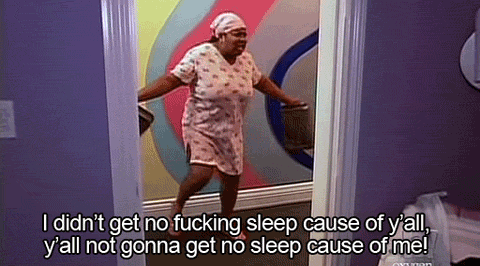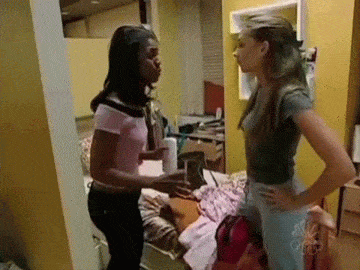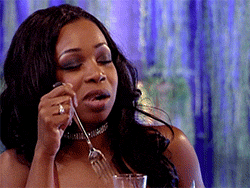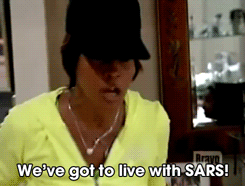At one point in time, black women experienced difficulties breaking into the entertainment industry. For black actresses, your options were portraying a nurse, educator, a domesticated role or nothing at all. Forget being the hero, we were shut out of the conversation. In 2017, you can turn on just about any network and see a black woman front and center, be it scripted or nonscripted. There's more than what meets the eye. If you're buying into reality TV, you'll find the longstanding "angry black woman" saga.
Where did America's romance with the perpetual "angry black bitch" myth begin?
Should we start with Kenya Moore and Porsha Williams exchanging blows during a 2014 Real Housewives of Atlanta reunion special? For true RHOA fans, you recognize this scene is just one of many brawls between the black Southern Belles featured on the highest rated Housewives franchise. Black women fighting are clearly selling points for advertisers. Bravo.

Photo: Bravo / Hello Beautiful
Or how about Tanisha Thomas' pots and pans rampage in season two of Bad Girls Club?

Photo: Oxygen / Tumblr
Maybe we can pin it on the president-elect's right-hand girl, Omarosa, and her nonstop cattiness seen inThe Apprentice, season one? Sorry, but I can't blame Omarosa for this one (as much as I'd like to).

Photo: NBC
Let's cut this historical timeline in half and go back to reality tv origins; The Real World. While MTV's longtime unscripted series isn't considered the first, it produced landmark content forever changing history and American TV watching habits. For the first time, viewers witnessed a same-sex couple exchange vows, a young adult living with HIV, and a woman's decision to abort her child as the cameras rolled. All just a few of many once taboo topics, which are now the norm for cable television. While America continued to marvel at wholesome family programming, the network's gamble on this edgy style of TV pushed the envelope like never before.
The Real World debuted in 1992 following the lives of seven strangers picked to live in a house, agreeing to give up any privacy as cameras followed their every move. A unique concept 25 years ago is now a millennials dream. The New York City installment of season one introduced viewers to the first depiction of young, woke African Americans; Kevin Powell and Heather B. The two were the only black housemates, both unafraid to tackle race-related topics. America's first encounter with white tears came in the form of Kevin calling his castmate Julie on her racism and microaggressions. She cried, leaving him forever to be the abrasive big black wolf.
Heather, on the other hand, is more notable.
For the most part, Heather was a nonconfrontational roommate. Not one to bite her tongue, she was pretty easygoing and gave respect where it was earned. In the last two minutes of episode 11 of 13, the police are called after a woman accuses Heather of assault at a party. The scene ends with the cops driving Heather away in a cop car. While we didn't see the actual fight, Heather says the girl called her a bitch, then proceeded to hit her. Right here is where the angry black woman narrative on reality TV could be pinpointed. This is up for debate because we did not get a chance to see the actual fight. She's frustrated, in the back of a cop car, pacing, and raising her voice, but still, there's more to her story.
What's interesting about Heather's role in the house is shown through her complicated relationship with Eric. He is sensitive and passive aggressive, while Heather is the exact opposite; direct and assertive. At the hallmark of their failed bond, Eric just wants to be her friend. In the episode prior to the season finale, Eric and Heather finally go at it. There's a back and forth as the other housemates watch, turning into a play fight with Heather wrestling Eric to the ground. Eric shares his insecurities with Julie (cry babies unite) and feels as though no one is sympathetic to his first time being away from home. Heather's "fuck your feelings" mentality leads the other women in the house to treat Heather as though she is insensitive and merciless. Heather is a natural born survivalist and hustler, Eric is not. Obviously, she finds no sympathy in his white privilege. The beauty of their exchange is the essence of the show's original premise; highlight our differences and find common ground to coexist.
They kumbaya it out with Eric helping Heather take out her box braids.
Eric's perception of Heather inadvertently laid the foundation for what is to come in the season to follow; OG Tami Roman. A year later, in season two of the show, we meet a 23-year-old Tami, like Heather, with musical ambitions. Due to her background, Tami isn't a stranger to hard work, making it known that nothing is given to her, despite the protests of the other black roommate, David who sees Tami as a spoiled brat. In this season, Tami gets her mouth wired shut as a means of weight loss, experiences an unwanted pregnancy ending in an abortion and she brings the first-ever reality TV brawl. Viacom has removed the scene from the web, but you've seen Tami Roman in action. She doesn't play. David tries to pull the covers off of her while she is in bed in her underwear, despite her screams (under laughter) not to do so, he drags her from the bed and she subsequently beats the shit out of him. Tami yells expletives and made it known that he is a troublemaker. While you want to feel for David after his apology, Tami expresses her discomfort with him being around, therefore David is the first housemate in show history to get evicted.
This wouldn't be our last run-in with Tami. We saw Tami's repeated physical and verbal altercations with Evelyn Lozada and other women on Basketball Wives. Two decades later, the rowdiness continued in 2015, with her Marriage Bootcamp: Reality Stars war of words. Reality TV viewers have witnessed Tami Roman's life changes, emotional outbursts, and heated debates. She outlasted the 15 minutes of fame expiration date. So how does all of this tie into the angry black bitch myth? Tami confirmed the stereotypes that Heather B presented by her white roommates. For two decades, Tami Roman has found something to be pissed off about and America has an obsession with ticking time bombs.
The most memorable reality stars are the ones who fall on the spectrum of outrageous to lunatic. We love to gawk at them, but at what expense? A white woman, we'll use Kendra Wilkinson here, is coddled and earns an entire show for her strength to cry out her mess of a life. The Kardashian klan is famous for Kim's vagina and their mother's business smarts to build an empire from her daughters' sexuality and affinity for black men. Oh, and they cry too. And what are black women on reality TV reduced to in this genre? Black bitches. When a white (or Armenian) woman airs out her frustrations, she is strong and a champion for standing up for what is right. When a black woman gets fed up..well, you know the story. She's argumentative, hard to handle, obnoxious, and downright insensitive.
Historically, black women have been made to believe our feelings are invalid and taught by our mothers, aunties and the church ladies to keep it together. When we try to keep our feelings in check but constantly pushed in a corner despite minding our own business, the frustration rears its ugly head. When we defend ourselves, it's far too late. The seed is planted. There's no going back. Every word from this moment on isn't heard from that of a human being, it comes from a mad black woman. Remember, Eric and the other housemates treating Heather like a sociopath for not catering to his feelings? Who caters to ours?
Same network, but let's change shows. Remember Gladys and Abe on Road Rules: Latin America in 1999? He kept picking and picking. She lashed out, but that wasn't good enough. Abe had to call her a bitch.
He felt the retaliation.
Some would argue, "she hit him first". Yeah, she did hit him first. You win that round. Where your argument crumbles in this scene is the fact that Abe's white male fragility was put to the test and his only defense mechanism was to try and reduce Gladys through name calling. She retaliated.
A scene dubbed as one of the ugliest showdowns in reality TV history is where the castmates on Real World Portland fight during the most drawn out duels on reality TV. Nia warns Johnny not to mess with her then Averey brings her happy ass along, in aims of defending her man's honor.
Even in a Variety article about the Nia vs. Johnny and Averey fight, the opening sentence reads, "On one of the final episodes of “Real World: Portland,” viewers watched as a cast member wrapped the cord of a blow dryer around its handle and hunted down another member of the house." Gossip blogs and media outlets with their show recaps keep the angry black woman stereotype going. This depiction is one-sided and unfavorable to the black character as always. Nia retaliated by extreme means only after she warned Johnny, "Play with me if you want to." This came between him placing a snotty tissue in Nia's lap and throwing a drink on her. Again, male fragility is put to the test when he feels threatened by not only a woman but a black woman. Once she got going, there was no stopping. The housemates soon considered Nia a threat and danger to the house, but my how things would have been different if Johnny had listened to her peace offering from jump street. A recurring theme.
Nia described the scene in an interview:
“This is what happened: he had the dog, obviously he threw the snotty rag on me and when I walked away he came back towards me and threw a drink in my face. Those punches were all delivered and that justified me grabbing the hairdryer for round 2 –eh maybe I shouldn’t have done that, But at the same time, I’m not a fighter. The first fight I got into was my last fight and I was 16 years old. I don’t touch people. I don’t violate people. People respect me and I respect them, or they keep their distance. To have somebody yet again bring spit to a verbal fight, I was over it. I was like “I have to teach these punk ass red necks a lesson.”
This is just one instance with Nia where the housemates feared for their safety, not to mention exchanging of spit.
The producers were aware of her market value to their core audience, promoting this season as the house versus Nia. Here, viewers come into the new season with past aggressions toward black cast members and preconceived notions that a black woman will lead to more disaster.
Peep the season 28 promo:
No one is playing innocent here. Nia describes herself as "manipulative" and "powerful", both qualities a sane person would not want to interact with. From here we can gather that she does indeed invite drama and loves to keep mess going. Because she is the black sheep, where every reality show needs one, black women like Nia are crucial for both rating and keeping this golden narrative alive. It's what the people want. Every good story needs conflict, even the unscripted ones. What we see repeatedly on reality TV is the underestimation of black women and their retaliation. She's only a danger to society when her aggressor feels victimized.
Viewers watch these shows, like any other show, with preconceived notions about the subject-matter, the stars, prejudice antics and everything else under the sun. The intent is entertainment; only adding frustration to biases that are optionally greeted with open-mindedness or opposition. Black women are notoriously viewed in society as monoliths entangled in a complex existence. There is a long-standing admiration with black women's features and eccentric nature, so it makes sense to have her on any show. Yet over time, each black woman presented on reality TV is met with the burdens of past characters. One black woman shows her ass on TV, the ones to follow carry viewer animosity. Cast members from other cultures and various backgrounds are not rattled with the task of carrying preconceived notions. Even black males have their own set of biases imposed by viewers, yes, but it doesn't come with the same price tag of toxicity.
Not only are black women perpetually stereotyped as mad on reality TV, but they're portrayed as unstable.

Photo: VH1/ Tumblr
Sex sells as do crazy black women. From the early days of reality TV with everyday young adults agreeing to give up their personal lives for a social experience, celebrities jumped on the train from Whitney Houston to Tamar Braxton and now Mariah Carey. Loud, flashy and boisterous.

Photo: Bravo
Where does the obsession start and stop? Well, the black women that sign up for the shows, just like their counterparts know what they're getting themselves into. There's a difference in actually filming the show and how it airs. Hell hath no fury than a producer hungry for a storyboard and an editor tasked with putting together all the pieces. The end product typically looks worse than what was originally captured. How should we end this narrative? Should all black women boycott joining the cast of trash TV? Nope. Maybe black women should tone it down? Nah.
As much time as we spend diagnosing the perceived rage of black women on television, we should also discuss the positive moments of camaraderie, philanthropy and the boss moves that many of these women are making off screen. The positive images on reality TV are always overshadowed by the ugly.
Black women on reality TV isn't the real issue. The problem is society's overall low regard for black women. The stereotype starts and ends with the viewers. Check your bias at the door.
"The most disrespected person in America is the black woman. The most unprotected person in America is the black woman. The most neglected person in America is the black woman." -Malcolm X (May 1962)
